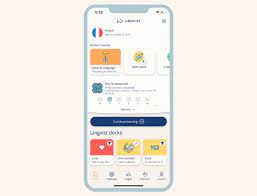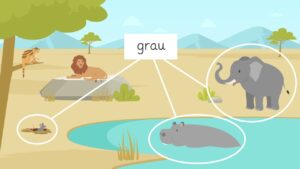Thank You in German — How to Make One "Danke!" Worth a Million Words
Don't Neglect the Etiquette
Saying "thank you" and "you’re welcome" is one of the first things you learn in a foreign language. German is no exception, where a simple danke can work wonders. As you learn German and become more advanced with the language, you'll find many formal and informal ways to express gratitude. Just like in English, different contexts require different phrases. While "thank you very much" would suffice in one case, you’ll want to opt for "I’m eternally grateful" in another one.
Germans are extremely courteous, so they dispose of quite a few ways to say "thank you", from the informal Ich danke dir to the formal Ich danke Ihnen or Vielen dank. Follow our regular dialogues between Birgit, a German instructor, and Alex, her American student turned German-language enthusiast. They know how to make you sound like a native in formal and informal situations and speak German fluently with minimum effort and maximum fun.
How to Say "Thank You" in German
- Du siehst heute strahlend aus, Alex!
- Danke, Birgit! Du siehst auch toll aus, wie immer!
- Tausend Dank, Alex!
- We’ve started on a good note. I wonder what the topic of today's class is.
- It’s saying "thank you" in German and responding to it.
- Oh, I thought I indeed looked strahlend.
- You’ll get loads of compliments from me if you behave today.
- Danke im Voraus, Frau Lehrerin!
- Bitte sehr, mein lieber Student! Your "thank you in advance" is accepted.
- So far, so good. I'd wrap it up at this point, so as not to kill this friendly atmosphere.
- You know we'll only wrap it up once you speak German fluently.
- Not gonna happen in this life, but thank you very much for believing in me.
Danke, just like this
- You know and actively use this German word, danke, which corresponds to the English "thank you".
- Yeah, a lazy way to say "thank you" in German. I was wondering if it isn't too informal, though.
- Well, they aren't informal or formal ways. They're just neutral, I'd say.
- Right.
- Do you know how to turn your "thank you" in German - danke - into something more casual or more polite?
- Well, I say Danke dir to my friends in an informal setting. I always think of it as an informal version because of the du pronoun.
- Perfect! The same logic applies to Danke Ihnen or Ich danke Ihnen. Adding a formal pronoun (Sie) makes this German phrase appropriate in formal situations.
- You know how to bring your favorite pronoun topic into any class, don’t you?
- Guilty as charged.
Danke sehr/schön - a bit more than a mere danke
- How do English speakers usually say "thank you", Alex?
- It depends. I typically opt for "thanks a lot" or "thanks loads". I feel that saying "thank you very much" makes my gratitude more pronounced.
- A great explanation. The same holds for German – extend your danke with sehr or schön - and it becomes "thank you very much". You can also say Vielen Dank! or Danke vielmals! to stress that someone did something extraordinary for you.
- Are these considered formal in German?
- They are appropriate for an official language setting. You can still use them with a friend. Check this video, for instance, where a tired girl gets some warm tea from her friend and wants to say how grateful she is:
Example #1 – Danke schön

Warmen Tee? Oh, danke schön. 00:14 - 00:18
- I think I might have also heard Tausend Dank! a few times. Is it one of those highly polite phrases in German?
- A good point. Tausend Dank! (a German equivalent of the English "a million thanks") would express a high degree of gratitude, albeit informally. In turn, Vielen Dank! ("many thanks") or Besten Dank! ("the best of thanks") would express the same level of gratitude in a formal context.
- So many nuances for a mere "thank you" in German. I’ll eventually get lost in them the way I got lost in the German flirting phrases.
- By the way, you need your danke phrases when flirting in German.
If you aim to be more eloquent
- You know those people who like talking a lot, right?
- Me?
- Us. I meant those ones who never just say danke but make a whole speech when expressing gratitude.
- Oh, I'm a bit scared of that kind.
- It may be painful, I know. Germans are pretty reserved and straightforward, but they also like long German danke phrases. Here are a few favorites:
- Ich bin dir (Ihnen, euch) dankbar – "I am thankful to you" (polite you, plural you);
- Ich bin dir (Ihnen, euch) sehr dankbar für…(e.g., die Hilfe) – "I am thankful to you (polite you, plural you) for..." (e.g., help);
- Ich sage dir (Ihnen, euch) vielen Dank – "I say many thanks to you" (polite you, plural you);
- Ich bedanke mich – "I offer you my thanks";
- Ich möchte mich recht herzlich bedanken – "I would like to thank you sincerely".
- Ich bin Ihnen dankbar... They all sound too polite.
- They do. I mean, even if you use the informal du pronoun, you still aim at a certain degree of formality with these lengthy phrases.
- You can’t get through a lesson without all the grammar, can you? And look how you’ve sneakily dropped in the pronouns and the Subjunctive möchte here.
- And how professionally you’ve spotted them, Alex! You must have a grammar allergy.
- Yup, that and peanuts.
Thank you very much from the bottom of my heart
- Some people like emotional, heartfelt "thanks" most of all. In German, they're also linked with das Herz ("heart").
- Yeah, like Ich möchte mich recht herzlich bedanken.
- Wow! You were quick to memorize that one, Alex! The following phrases are also quite popular:
- Vielen herzlichen Dank!
- Recht herzlichen Dank!
- Herzliches Dankeschön!
- These herzlichen dank phrases sound sweet. I shall be using them with girls.
- Please do. They have a tad of formality but still sound just right with close people. Oh, by the way, do you want to know a slightly weird German "thank you" used by the elderly?
- I guess I have no choice.
- It's Vergelt’s Gott!
- I don't know the literal translation in English, but it has to do with God and money.
- Right: "May God reward you!" You’ll hear this religious, formal form a lot from older people, especially in southern Germany and throughout Austria.
- I'll keep it up my sleeve in case I need to impress a girlfriend’s granny from a southern region, then.
Saying "thank you" in German without saying danke
- Don’t you always say German is pretty structured and has no abundance? Why are there so many danke forms in this language, then?
- That's the last section, I promise. I’m going to teach you how to say "thank you" in German without even using "thank you".
- Highly useful.
- It is if you aim to sound like a native language speaker and impress that special German girl.
- Oh, if that's the case, Vielen dank für die Hinweise!
- Im Voraus? Jot these down:
- (Danke) sehr aufmerksam – "(Thank you) that’s very kind".
- (Danke), gleichfalls/ebenfalls/ebenso – "(Thank you,) the same to you".
The former is used to express a large amount of gratitude not covered by a mere danke or even danke schön in German. So, Alex, let's practice. Ich wünsche dir einen schönen Tag!
- Gleichfalls, Birgit! Ich mag deine Beispiele so sehr!
- Herzlichen dank, Alex!
FAQ: Why do people say Danke?
People use German danke ("thank you") for a variety of reasons, e.g.:
- when they receive a gift (Danke für das Geschenk!)
- when someone wishes them a good meal / Guten Appetit! (Danke schön! Danke Ihnen)
- when someone says they look great (Danke, gleichfalls!)
- when someone helps them (Vielen Dank! Ich bin dir dankbar)
How to Say You're Welcome in German
- Now that you know how to thank people, let’s try replying to the "thank you" in German. Shall we try it immediately? Thank me for something.
- Thank you for the fantastic lesson, Birgit!
- I meant in German, Herr Sly.
- It was worth trying. Ok, then: Danke für diesen fantastischen Deutschunterricht, Birgit!
- Gerne! Ich danke dir auch für deine harte Arbeit, Alex!
- Nichts zu danken, Birgit!
- Wow! You already know lots of great vocabulary. Let’s just structure it a bit.
The good old bitte
- What is the most common way to respond to "thank you" in German?
- Obviously, the first word that comes to mind is bitte. I just wanted to impress you, so I was looking for something fancier.
- Heh, classic Alex. Regarding bitte, i's quite a versatile word. It generally means "you are welcome" in German. You’d still use it instead of these English phrases too:
- "Pardon me?"
- "Go ahead!"
- "Here you go."
- "Please."
- "You’re welcome."
- Germans are indeed language thrifty. One word gets it all done for them.
- A great way to save time when you learn languages, isn't it?
- I bet it's not that easy. There should be a trick you're gonna unveil.
- Well, kinda. How did you know?
- Oh, just a hunch.
- You can opt for bitte sehr and bitte schön as well. These longer versions would normally be used to respond to danke sehr and danke schön.
- I can memorize these. They’re easy.
- By the way, beware of this seemingly "easy" bitte. It may acquire other meanings and even sound unfriendly.
- This one's making my brain boil.
- Check this video: Kannst du bitte aufhören, Gitarre zu spielen? Es ist zu laut. It will help you sort out different shades of German bitte.
Example #2 - Bitte

Kannst du bitte aufhören, Gitarre zu spielen? 02:09 - 02:13
- My turn, Birgit. Kannst du bitte aufhören, mir so viele Beispiele auf Deutsch zu geben? Es ist einfach zu viel.
- Sehr, sehr unhöflich.
- What about this one: Könntest du vielleicht aufhören, mir so viele Beispiele jetzt zu geben? Ich brauche etwas Zeit, um sie zu bearbeiten.
- Klar. Kein Problem. You speak German so fluently. I'm under a positive impression.
- Vielen dank, Birgit! That's because I've been secretly watching videos on Flying Languages. Language learning is indeed fun with this website.
- Didn't I tell you so? You can learn German and other languages there.
- Yeah, once I find a way to extend my day to 48 hours.
What about a formal bitte?
- I fear there’s more than these few forms, Birgit.
- Well, since you have a few formal options for "thank you" in German, it makes sense to have some fancy responses, doesn’t it?
- I guess…
- The ones listed below imply some modesty on your part. You would use them to express a very polite attitude:
- Gern geschehen – "Done gladly";
- Mit Vergnügen – "With pleasure";
- Nichts zu danken – "Nothing to thank for";
- Keine Ursache – "No reason to thank".
- I’ve also heard simple gerne in response to my Ich danke dir! or Ich danke Ihnen! Was that wrong?
- It was correct. You would go for gerne to sound less formal than it is with Gern geschehen! It still shows you did something with pleasure for a person. By the way, the waiter in the video uses Gerne a lot, albeit accompanied by formal pronouns:
Example #3 - Gerne

Dann nehme ich den Weißburgunder. Den Weißburgunder, gerne. 00:24 - 00:26
- They’ve just used all kinds of responses to "thank you" in German... What about Kein Problem? Would it be the same as Keine Ursache?
- Kinda. It would be less formal and more popular. You can either use it as a response to danke or use it to say you are not offended: e.g. Entschuldigung für meine Verspätung! – Kein Problem.
- Noted. Now you just need to give me a tip on how to reply to that girlfriend's grandma when she says Vergelt’s Gott!
- I envy your memory, Alex!
- Danke dir!
- And very polite, heh. So, the appropriate response would be Segne es Gott ("Bless it, God!").
- Gee. I can't picture myself saying something that bookish without bursting out with laughter. Gott sei dank I can pretend to be a serious guy.
- Yeah, let me know how it went once you’ve tried this one.
FAQ: How do you use bitte in German?
Germans use bitte excessively. Bitte/bitte sehr/bitte schön is more than just a common response to danke/danke sehr/danke schön. Bitte is also used to mean "Yes, please!" (Darf ich Ihnen helfen? - Bitte!) or "Here you go" (Eine Tasse Kaffee bitte. - Bitte sehr).
Ich Danke Euch fürs Lesen
Knowing the rules of etiquette is just as important as knowing the language itself. A basic "thank you" in German can melt hearts and open doors. While we have not covered every possible context in this article, we have tried to give you an extensive overview of possible ways to express gratitude in German. As a foreigner, you will hardly be scolded for using the simplest form every time. However, as a person willing to master a new language and reach a native speaker level, you are bound to learn tiny distinctions and flairs of these expressions to feel the distinction between formal and informal phrases.
Ich bedanke mich für eure Interesse! Follow Birgit and Alex for more language tips and interesting topics. They will help you polish your spoken and written German. On top of that, they know how to help you review grammar in every single lesson of Flying Languages. Have you noticed how Birgit incorporated pronouns and their declension, verb conjugation, Subjunctive, and articles into this conversation?






